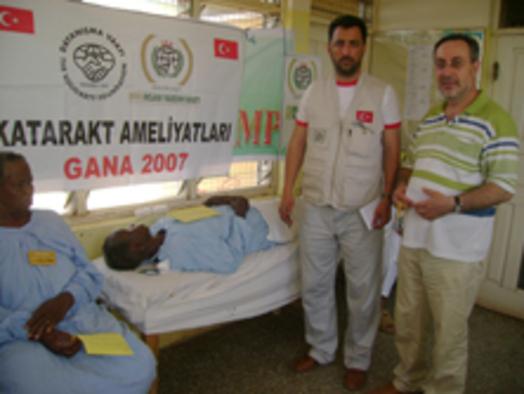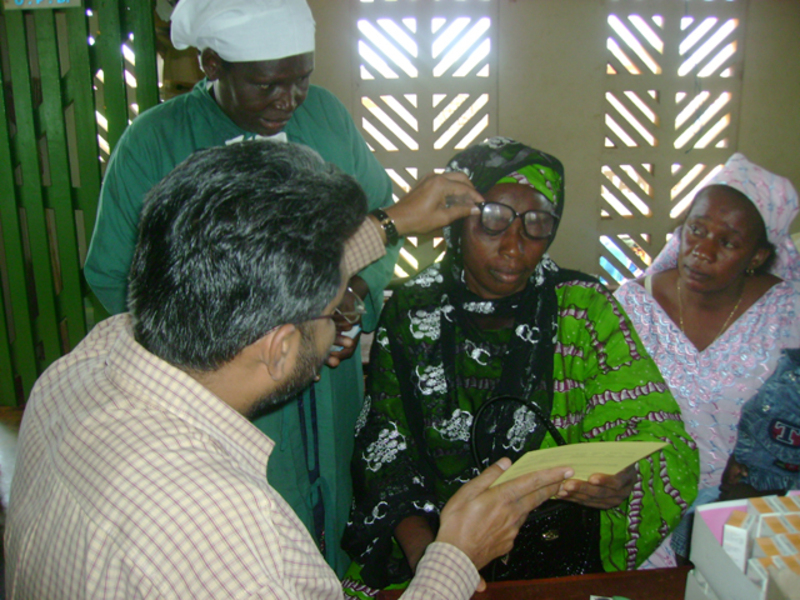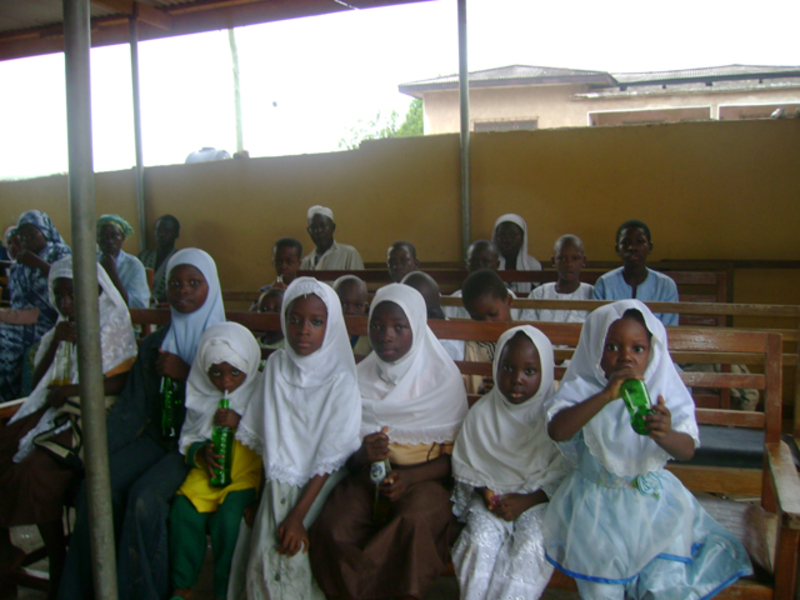
AMA works daylong
The first thing we did after unpacking our cases was to organize a meeting about cataract operations in the country. For the meeting, we headed for the Africa Muslim Agency (AMA) headquarters, a three-floor building. The AMA has three centers in Ghana: Mercy Center in Accra, Abdullah el-Uveysi Center in Kumasi and Ebu Bekir Siddik Center in Kumasi. There are health clinics in all the centers and these clinics provide dentistry, obstetrics and general health services free to the poor and in return for a small amount of payment to those with better financial standing. There is also a pharmacy within the agency where patients can get their medication at cost. The AMA has also 24 mobile clinics, which provide various health services. These clinics are offering services around the clock to fight HIV-associated diseases, malaria and hygiene-related ailments.
The AMA also provides educational services to orphans. Currently, 4,000 students and 850 orphans benefit from services of the AMA. The agency is preparing to open two new centers in the Volta region. Other services provided by the AMA include drilling water wells in dry regions, delivering fast-breaking dinners in tents during the Ramadan and delivering food at houses with mobile kitchen for those people who cannot reach the tents.
Fresh hope for Africa
The delay in operations gave us the opportunity to visit our partner organization Ghana Muslim Agency (GMA). We were met by Mr. Yakup, vice-president of the GMA, in the capital city of Accra. We discussed GMA’s projects for 2007 with general-secretary Mr. Muniru and Isa, who is in charge of financial affairs. We were quite pleased by the detailed projects. It is certain that the continent is facing serious problems but to see such ambitious projects aimed at overcoming these problems raises our hope about Africa and motivates our own works.
Meeting with orphans
The following day we visited the Islamic Council to see 20 orphans supported by the IHH as part of the orphan project. We were met by Sheikh Mustafa Ibrahim, the council president, and informed about the orphans. We got the opportunity to see and collect information about 16 out of the 20 orphans, whose all expenses are met by the IHH, as well to discuss their school success and health conditions. Thank God, the orphans are in good state, well-dressed and quite successful in their schools. Except for little ones, the others have learnt how to read the Quran. We listened to and were moved by some orphans reciting surahs from the Quran. We left the orphans to visit Ghana Mufti Sheikh Nuruosmani. He tells us about missionary activities and gigantic churches built in the country. We headed for Accra Central Mosque to perform the Friday Prayer after giving a substantial amount of donation to the mufti, because he also helps orphans in certain ways. We had to perform our prayer on the soil since there was no room left inside the mosque. Although it is the biggest mosque in Accra, it is neglected and has many deficiencies.

Ayman Barakat took us to the airport on Saturday at 9.00 a.m. We reached the city of Tamale after one-and-half-hour journey. We were met by Dr. Mustafa Ibrahim, manager of Ebubekir Siddik Center, the center of the AMA in Tamale. The center is home to 113 orphans. Although the orphans are supported by Kuwaiti associations, we were told that the center still has financial difficulties.
After performing our prayers and having eaten something at the house of Dr. Mustafa, we left for the southern city of Wa, where cataract operations would be performed. We didn’t make a road trip in the sense that most of us would think of, but had a six-hour journey through a forest which was part of a national park and got to Wa around 10.00 p.m.
Cataract operations commence
We immediately went to the center where Pakistanis doctors who would perform cataract operations were staying. The doctors appeared to be impatient about operations that would start the following day. We held a meeting with the 18-person medic group and the group’s coordinator Mr. Halil and went to bed waiting excitedly for the operations in the morning.
From dark to the light
Operations started at 7.30 a.m. the following day. Totally 160 operations, 100 on the first and 60 on the second day, were performed and 1,500 underwent eye examination. Patients were given spectacles or medication depending on their problems. You cannot express the excitement and happiness of the patients. It is a big happiness and pride that these people who had lived in the darkness for years and whose every action had been restricted would regain their sight after a short operation.
As operations were going on, we made video recordings in the operating and anesthesia rooms. The doctors are qualified in their fields. Each operations takes about no more than 15 minutes. Although the average age for the patients is very high, there are several young patients as well. The way they and their families wait for the operation is clearly different than others’.

Our doctors are professional
The patients are taken to the anesthesia department after undergoing general blood pressure and other routine health controls. Here patients are implemented an hour-long local anesthesia. The operating room where cataract operations are performed is hygienically perfect, although the other operating rooms of the hospital are not healthy in terms of hygiene. We do our best to keep the operating room as clean as possible in cooperation with the doctors and other members of the team. The doctors, who are registered with Al-Basar International Foundation, are quite good at cataract operations, because they have performed such operations for 15 years in Africa and Asia.
281 people brought to the light
After performing 281 cataract operations, over 5,000 eye examinations and medication treatments, we left the city of Wa for Tamale. We were pleased because we witnessed people regaining happiness and clinging to the life. We got to Tamale after a nine-hour journey via the city of Techiman. Then we flew to the capital Accra and attended a program organized by the orphans in the AMA center. This was our last day in Ghana and we headed for our country leaving behind our hearts.
What did we bring from Ghana? We brought for Turkish Muslims undefinable love, greetings and payers from our Ghanaians brothers and sisters whose eyes were operated on and who underwent eye examinations and were delivered medication.